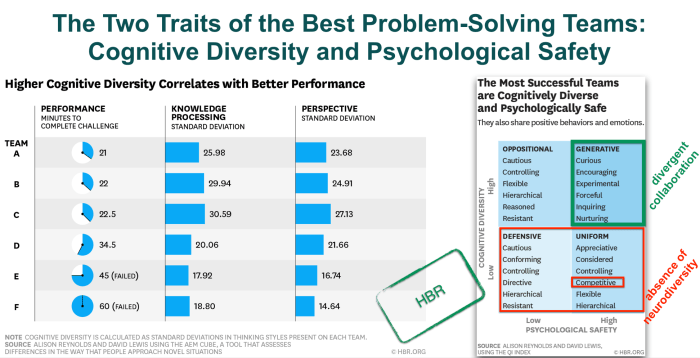Autists are acutely aware that culture is constructed one trusted relationship at a time – this is the essence of fully appreciating diversity.
 Society must start to move beyond awareness and acceptance towards appreciation of cognitive diversity. The topic of culture is a double edged sword. On the one hand a shared culture can streamline collaboration, but on the other hand, the more open and diverse a culture, the more friendly it is towards minorities and outsiders.
Society must start to move beyond awareness and acceptance towards appreciation of cognitive diversity. The topic of culture is a double edged sword. On the one hand a shared culture can streamline collaboration, but on the other hand, the more open and diverse a culture, the more friendly it is towards minorities and outsiders.
It is very easy for groups of people and institutions to become preoccupied with specific cultural rituals and so-called cultural fit, whereas what matters most for collaboration and deep innovation is the appreciation of diversity and the development of mutual trust. This is obvious to many autistic people, but only very recently has cognitive diversity started to become recognised as genuinely valuable beyond the autistic community.

I prefer to talk about collaborative advantage.
Inclusive culture is minimalistic. Adopting a small backbone of explicit first principles that have a track record of encouraging trust building and learning helps. In contrast, relying on the social transmission of hundreds of unspoken rules via “osmosis” is not only distinctly autism unfriendly – but also stands in the way of collaboration across cultural and organisational boundaries at all levels of scale.
It is precisely because autists have to spend conscious effort on understanding each individual that we are well equipped to act as a catalyst and translator between very different cultures.
The catch is that this unique capability only becomes apparent if the cultures in question are open to potential collaboration with the rest of the world, and are not learning disabled by in-group competition and fear of the unknown.

Autists learn very early on that the only way to confirm shared understanding is by asking explicit and sometimes probing questions. This behaviour is not rude, it is the only way to establish bridges across cultural boundaries.
Autists are like the canary in the coal mine of mainstream society. We are amongst the first who are affected by pathologically hyper-competitive cultures.

Whilst in this interview I intentionally highlight the great potential of autistic collaboration, the full extent to which society currently still discriminates against autistic perspectives and behaviours must not be forgotten. This talk by Jon Adams (42 mins) on autistic culture and identity highlights some of the challenges.
Only last week I met an autist who had lost three friends to suicide and I heard stories about psychologists who are afraid of openly identifying as autistic because such disclosure still represents a significant risk to their careers. This presentation on the link between neurodiversity and creativity contains references to the suicide statistics that affect the entire autism spectrum. Here is a concrete example from last year that should provide serious food for thought. There is an urgent need for changes in society.
It is time for society to acknowledge the level of mutual interdependence between all humans. By being able to effortlessly and subconsciously adopt and benefit from unspoken rules and socially constructed beliefs – regardless of whether these beliefs create negative social and environmental externalities, those with a rather typical cognitive lens are ill equipped to recognise the level of support that society affords them, and the level to which their survivals depend on assistance by others.
In contrast, those with an autistic cognitive lens have to rely on explicit questions to discover unspoken rules and are instinctively inclined to critically assess socially constructed beliefs in terms of systemic impact before embracing them. A critical perspective on the status quo and entrenched beliefs is a prerequisite for progress across all human endeavours.

Aut Collab, your blog will soon be added to our Actually Autistic Blogs List (anautismobserver.wordpress.com). Please click on the “How do you want your blog listed?” link at the top of that site to customize your blog’s description.
Thank you.
Judy (An Autism Observer)
[…] Source: What society can learn from autistic culture | Autistic Collaboration […]
[…] Source: What society can learn from autistic culture | Autistic Collaboration […]
[…] Source: What society can learn from autistic culture | Autistic Collaboration […]